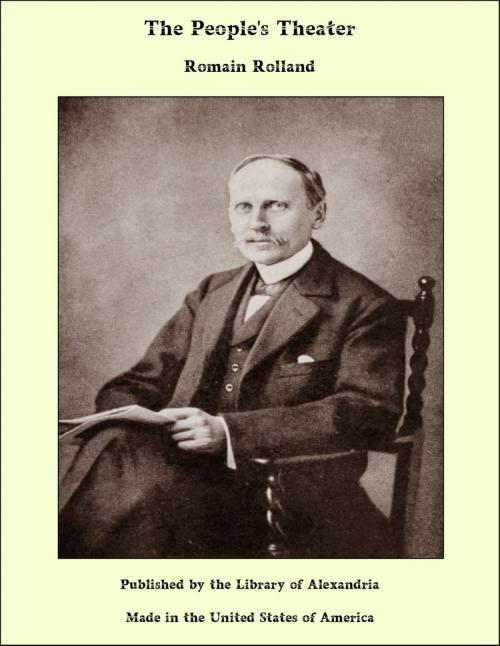| Author: | Romain Rolland | ISBN: | 9781465614001 |
| Publisher: | Library of Alexandria | Publication: | March 8, 2015 |
| Imprint: | Language: | English |
| Author: | Romain Rolland |
| ISBN: | 9781465614001 |
| Publisher: | Library of Alexandria |
| Publication: | March 8, 2015 |
| Imprint: | |
| Language: | English |
A curious phenomenon has occurred during the past ten years. French art, the most aristocratic of arts, has come to recognize the masses. French artists have, of course, known of the existence of the people before, but they have considered them only as subjects of conversation, as material for novels, plays, or pictures. "An admirable subject to treat in Latin verses." But they never took the people into account as a living entity, a public, or a judge. The progress of Socialism has directed the attention of artists to this new sovereign whose politicians up to the present had been its sole spokesmen: authors and actors. And they have discovered the people—discovered, I venture to say, in much the same manner as explorers discover a new market for their wares. The authors wish to import their plays, the State its repertory, actors, and officials. It is a comedy in itself, with a part for each. This is not a fit subject for irony, for no one is quite exempt from its shafts. And we must take men as they are, nor seek to discourage their conscious or unconscious efforts to combine personal with public gain—provided the latter is assured. But such is the case; and from this movement which progresses so quickly that bad is bound to come hand in hand with good, and personal with public profit, I wish to call attention to but two points: first, the sudden importance assumed by the people in art (or rather, the importance ascribed to the people, for they never speak for themselves; everyone assumes the rôle of spokesman for them); and second, the extraordinary diversity of opinion as to the nature of democratic art itself. In fact, among those who claim to represent the aims of the people's theater, there are two diametrically opposed ideals: the adherents of the first seek to give the people the theater as it now exists, any theater so long as it is a theater; those of the second attempt to extract from this new force, the people, an entirely new theater. The first believe in the Theater, the others in the People. The two have nothing in common: one is the champion of the past, the other of the future. I need not tell you where the State stands. By its very definition, the State always belongs to the past. No matter how new the forms of life it represents, it arrests and congeals them. But you cannot fix life once for all. It is the function of the State to petrify everything with which it comes into contact, and turn living into bureaucratic ideals.
A curious phenomenon has occurred during the past ten years. French art, the most aristocratic of arts, has come to recognize the masses. French artists have, of course, known of the existence of the people before, but they have considered them only as subjects of conversation, as material for novels, plays, or pictures. "An admirable subject to treat in Latin verses." But they never took the people into account as a living entity, a public, or a judge. The progress of Socialism has directed the attention of artists to this new sovereign whose politicians up to the present had been its sole spokesmen: authors and actors. And they have discovered the people—discovered, I venture to say, in much the same manner as explorers discover a new market for their wares. The authors wish to import their plays, the State its repertory, actors, and officials. It is a comedy in itself, with a part for each. This is not a fit subject for irony, for no one is quite exempt from its shafts. And we must take men as they are, nor seek to discourage their conscious or unconscious efforts to combine personal with public gain—provided the latter is assured. But such is the case; and from this movement which progresses so quickly that bad is bound to come hand in hand with good, and personal with public profit, I wish to call attention to but two points: first, the sudden importance assumed by the people in art (or rather, the importance ascribed to the people, for they never speak for themselves; everyone assumes the rôle of spokesman for them); and second, the extraordinary diversity of opinion as to the nature of democratic art itself. In fact, among those who claim to represent the aims of the people's theater, there are two diametrically opposed ideals: the adherents of the first seek to give the people the theater as it now exists, any theater so long as it is a theater; those of the second attempt to extract from this new force, the people, an entirely new theater. The first believe in the Theater, the others in the People. The two have nothing in common: one is the champion of the past, the other of the future. I need not tell you where the State stands. By its very definition, the State always belongs to the past. No matter how new the forms of life it represents, it arrests and congeals them. But you cannot fix life once for all. It is the function of the State to petrify everything with which it comes into contact, and turn living into bureaucratic ideals.















